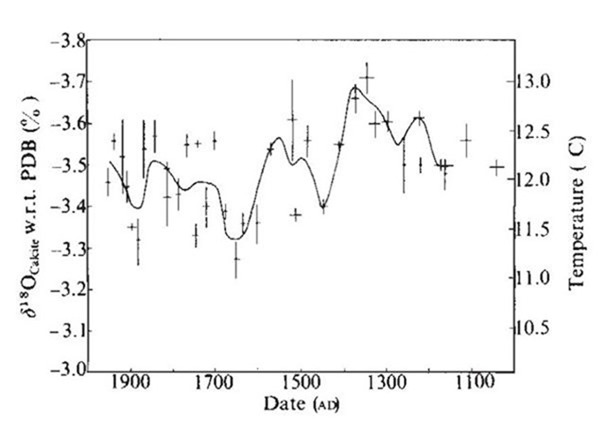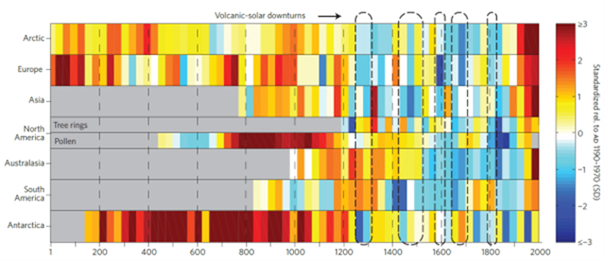- Oct 20, 2014
- 18,369
- 19,501
- AFL Club
- Hawthorn
- Other Teams
- Liverpool
Nice coverup
Follow along with the video below to see how to install our site as a web app on your home screen.
Note: This feature may not be available in some browsers.
On the other hand, the alarmists fall into these categories
1. scientists whose funding depends on the global warming consensus
2. school children and students whose teachers have brainwashed them to the global warming consensus
3. doctor's wives and other wealthy inner city greens who don't believe in the science of vaccinations
The royalties from those fossil fuels and taxes payed from the business and employees pays for those teachers, infrastructure, medical etc that we see today
it's just an extension of what you note- partisanship. greenies were probably the first to accept AGW wholesale as a thing so naturally those that traditionally oppose environmentalists are still holding out. hippies still oppose GMOs despite the research and evidence and i see AGW as the same deal for many on the Right.
there are also the (kinda) non-aligned contrarians who either oppose big business and are more likely to accept AGW, or contrarians who oppose big government and are more likely to deny it. in a world of vaccines causing autism, hoax moon landings, 911 inside jobs, flat earths and chemtrails, nothing is surprising.
Equating artificial selection to GMO is sophistry.Hippie types who fight GMOs probably annoy me the most. They want everyone to believe the science on climate change (correctly) but then run counter to the science on GMOs. Anti-vax and chemtrails are just on another level. They are not mainstream and not worth mentioning. However, climate change denying "conservatives" and anti-GMO environmentalists are fairly mainstream.
There is nothing we buy from the supermarket that is not a GMO. The best example is all of the "different" vegetables we eat that are really just modified wild mustard. Off the top of my head is broccoli, cauliflower, kale, spinach and mustard. Wild apples and strawberries are gross. Point me to cows and sheep that survive in the wild that are not feral.
What angers me the most is protests against amazing advancements like modifying rice to increase the vitamin A intake for poor Asians. Sorry folks, but that is the ultimate expression of your feels not being able to see past your white privilege.
It is hard having to deal with the alt-right, anti-trans feminists and anti-GMO hippies all at once in this hyper-connected post-internet world. Seeing people use high IQs to warp reality and twist arguments to serve their team, rather than an honest pursuit for the truth.
No it ain't. Genetic engineering is the extreme measures many are in a panick over. Of course, that is also sillyEquating artificial selection to GMO is sophistry.
Are you in favour of genetically engineering children?No it ain't. Genetic engineering is the extreme measures many are in a panick over. Of course, that is also silly
Also for those who continue to argue for the MWP. It was warm in Europe and the northern Atlantic. However, it was a cold period in central and eastern Eurasia. This is why it was not a warm period for global average.


An examination of cave stalagmites in New Zealand produced the following conclusion: "Wilson et al... found that the proxy temperature record provided by the stalagmite was broadly similar to the climate record of England, exhibiting a period in the early part of the past millennium that was about 0.75°C warmer than it was in the mid-20th-century. And based on that finding they made the broader conclusion that such climatic fluctuations as the Medieval Warm Period and Little Ice Age are not just a local European phenomenon."
Teachers rely on peer advised facts, not peer reviewed facts. Just like everyone else in society. They propagate what is believed to be fact.
I'll reiterate.What is taught in education relies on the prevailing scientific consensus from experts in science. Science curriculums (and to an extent history curriculums) are regularly updated to reflect these changes. Prevailing scientific consensus is backed up by reputable, scientific empirical data, collected through the scientific method, by experts in those fields.
For example, in relation to the history curriculum, I teach that the 'Out of Africa' theory of human evolution is the most supported by the evidence, Hitler died in 1945, the Romanovs were executed in 1918 with no survivors and the remains of Richard III were found underneath a carpark in Leicester
When further discoveries are made and theories subsequently updated and agreed to by the consensus of scientists across a variety of scientific, fields then the curriculum will subsequently be updated.
In regards to climate change, multiple studies published in peer-reviewed scientific journals suggest that 97 percent or more of actively publishing climate scientists agree that climate-warming trends over the past century are extremely likely due to human activities. Nearly 200 worldwide scientific organizations hold the position that climate change has been caused by human action. The position of education in teachign clinate change reflects that majority view.
I'll reiterate.
They know it is the fact because they have been told it is the fact, they don't know the why.
Now I can't expect primary school teachers who can't differentiate they're, their or there on their Facebook posts to understand the issue in depth, but at least I acknowledge they are preaching the ideology and not the facts.
There is a difference between me saying the facts are wrong and that they aren't teaching the facts, they are teaching the ideology. I don't disagree with either the facts or the consensus, I do have an objection to ideological teaching I picked up from religious schools.
Hang on, how is this a good basis for contemporary climate modelling?
As I said, scientific consensus suggests that climate-warming trends over the past century are extremely likely due to human activities. Teachers do a fair bit of professional reading. For example secondary teachers who teach climate change or related topics rely on reports such as the Intergovernmental Panel on Climate Change (IPCC) for information.
Consensus? Yeah, nah.
The IPCC claims in its most recent report that it is '95 per cent' sure that 'more than half' of the warming 'since 1950' is man-made. It sounds impressive but it’s a pretty vague claim.
And you really cannot have much of a consensus about the future. Scientists are terrible at making forecasts, especially about complex systems. The climate is a chaotic system with multiple influences of which human emissions are just one.
This is why the the IPCC actually gives a range of possible future temperatures. It thinks the world will be between about 1.5 and four degrees warmer on average by the end of the century. That’s a huge range, from marginally beneficial to terrifyingly harmful, so it is hardly a consensus of danger.
Then when you look into more detail about the assumptions of these projections the IPCC admits that the top of the range will only be reached if sensitivity to carbon dioxide is high, if world population growth re-accelerates, if carbon dioxide absorption by the oceans slows down, and if the world economy increases its coal use tenfold. Each of these assumptions are implausible so the extreme IPCC projection is very implausible. This is the skeptical middle ground.
Run this by one of your science teachers and tell me I'm wrong.
Consensus? Yeah, nah.
The IPCC claims in its most recent report that it is '95 per cent' sure that 'more than half' of the warming 'since 1950' is man-made. It sounds impressive but it’s a pretty vague claim.
And you really cannot have much of a consensus about the future. Scientists are terrible at making forecasts, especially about complex systems. The climate is a chaotic system with multiple influences of which human emissions are just one.
This is why the the IPCC actually gives a range of possible future temperatures. It thinks the world will be between about 1.5 and four degrees warmer on average by the end of the century. That’s a huge range, from marginally beneficial to terrifyingly harmful, so it is hardly a consensus of danger.
Then when you look into more detail about the assumptions of these projections the IPCC admits that the top of the range will only be reached if sensitivity to carbon dioxide is high, if world population growth re-accelerates, if carbon dioxide absorption by the oceans slows down, and if the world economy increases its coal use tenfold. Each of these assumptions are implausible so the extreme IPCC projection is very implausible. This is the skeptical middle ground.
An examination of cave stalagmites in New Zealand produced the following conclusion: "Wilson et al... found that the proxy temperature record provided by the stalagmite was broadly similar to the climate record of England, exhibiting a period in the early part of the past millennium that was about 0.75°C warmer than it was in the mid-20th-century. And based on that finding they made the broader conclusion that such climatic fluctuations as the Medieval Warm Period and Little Ice Age are not just a local European phenomenon."

https://www.nature.com/articles/279315a0
There are several similar studies for the region which drew similar conclusions.
Temperature reconstruction on a continent basis for the past 2000 years:

https://www.nature.com/articles/ngeo1797
Mann's global average for that period has been accepted. Can you publish a paper disproving it that will get through the peer process?
Science is not done with a graphic on a blog. There are reams of data involved. Then the data, the statistical analysis and then the conclusions that were drawn go through a difficult process to get approved by a scientific journal.
This is not an argument from authority. It doesn't matter what your position is in life. If your science stands up to this rigour it will get through.
I'm not in a position to postulate anything, just asserting that Mann's methods in erasing the MWP (and LIA) are highly controversial. That much is well documented and beyond dispute.
It isn't though. Just a few right wing bloggers stating it is controversial doesn't make it so.
C'mon mate, he's been the subject of various federal investigations into scientific fraud. Yeah he was eventually cleared, but so was O.J.Simpson and the rest of the Climategate mob. Which is not to suggest he's never done valuable work, as have many controversial scientists on both sides of the debate.
